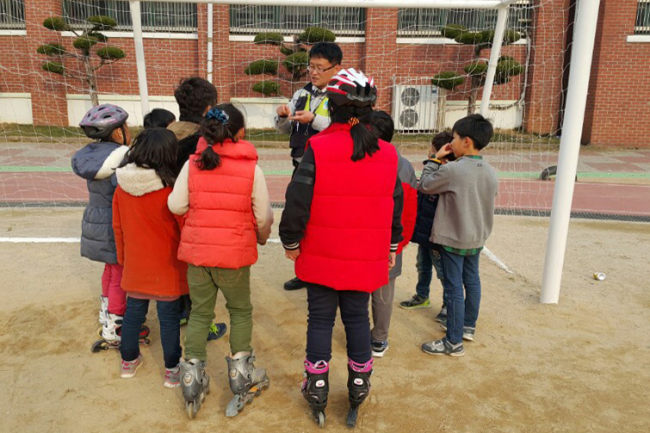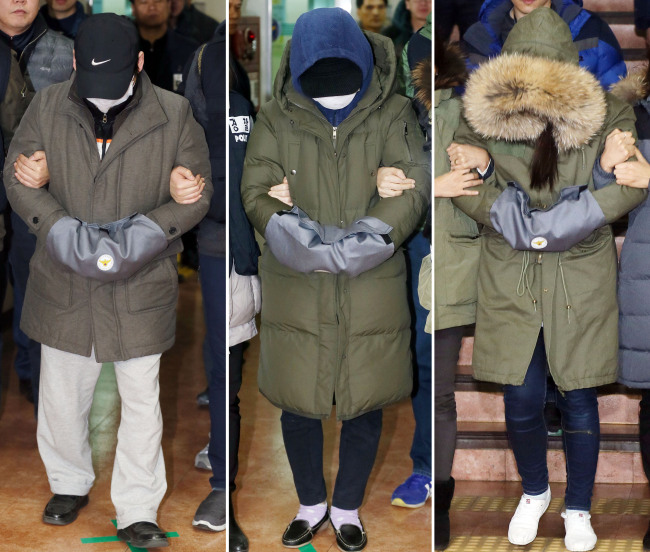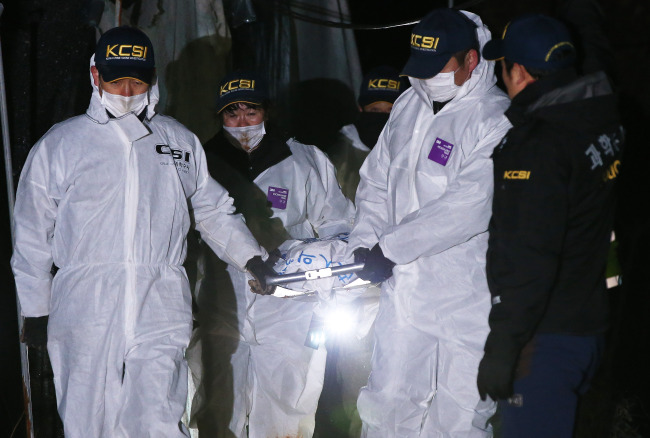The South Korean government has been striving to curb violence in various corners of society, including at schools, homes, workplaces and online. The Korea Herald is publishing a series of articles delving into the reality and the country’s efforts to restrain the violence. This is the third installment. — Ed.
 |
| A police officer teaches children how to report child abuse cases at a school in Gwangju on Feb. 23. (Yonhap) |
Child abuse counselor Lee Tae-ho remembers when he and other police officers were dispatched to an apartment in Seoul in October 2014 after a neighbor reported the sounds of a child being beaten on the floor below.
They found a mother in her 40s hitting her 10-year-old daughter with a rice paddle for not getting a perfect score on a school exam. When Lee tried to intervene, the mother resisted, claiming it was her way of disciplining her child.
Corporal punishment, or “rod of love,” remains the most common justification behind what escalates into child abuse, according to the counselor.
“The mother, after several rounds of counseling, said she used to think of her daughter as her possession, not as an individual person. Her unrealistic expectations for her child led to child abuse in this case,” said Lee, who works for the National Child Protection Agency.
A total of 10,027 cases of child abuse were reported in 2014, according to the latest statistics available at the Health and Welfare Ministry. From 2004 to 2013, a total of 95,622 child abuse cases were reported to child protect agencies, the Korean Institute of Criminology’s report shows, with more than 55,000 cases confirmed. This indicated that an average of 15.2 child maltreatment cases happened daily.
Of abuse cases reported from 2004-2013, 83 percent were perpetrated by the parents. Such cases rose sharply, by 72 percent overall from 3,167 in 2004 to 5,454 in 2013.
Separate data from the government also showed that a total of 148 children died of abuse from 2001 to the first half of last year.
Discipline or child abuse?
 |
| A 47-year-old pastor (left) and stepmother (center) are taken into custody for beating their 13-year-old daughter to death and hiding the body for 11 months in Bucheon, Gyeonggi Province, on Feb. 4. The deceased girl’s aunt (right) is also charged with abusing the child. (Yonhap) |
Physical punishment is considered a traditional method of discipline in South Korea.
While most municipalities have banned corporal punishment in schools since 2008, physical punishment at home is still debated here — whether parents have the right or whether the form of discipline is even effective or constructive.
“Traditional Confucian culture has emphasized the parents’ duty to teach and discipline their children for a better future, whereas the children’s rights as individuals have not been respected,” said Lee Bae-keun, president of the Korea Association for Prevention of Child Abuse and Neglect.
“Such social consensus over parents’ rights and duty to discipline their children has silently allowed them to physically punish the children with the so-called ‘rod of love,’” said Lee.
Experts pointed out that despite the prevalent discipline culture, there is a clear difference between discipline and abuse.
“Although the line may be ambiguous, child abuse is usually repetitive and persistent, unlike discipline. The intensity of the punishment is also much stronger. Children who get punished sense for themselves first whether they are being abused or disciplined,” said social welfare professor Kim Jun-hwan of Chung Cheong University.
Lee of KAPCAN noted, “The discipline is only successful when empathy is shared first. Children must be persuaded as to why they are being punished.”
This year, a series of extreme child abuse cases leading to the death of the children at the hands of their parents reignited the debate as to whether Korean society’s relatively lenient attitude toward physical discipline runs counter to the protection of the young from violence.
Last month, a 42-year-old mother surnamed Park in Goseong, South Gyeongsang Province, was arrested for allegedly beating her 7-year-old daughter to death and leaving the child tied to a chair overnight. The mother claimed she had attempted to discipline the child for damaging the furniture. Police decided to charge the mother for violating the child protection law, killing the victim and abandoning the body. Prosecutors are currently looking into adding a murder charge.
“Many parents do not realize that small physical punishment is the start of child abuse. Once the abuse continues over three years, it is difficult to stop it,” said NCPA counselor Lee.
Physical punishment at home has been banned in 48 countries, starting with Sweden in 1979, Finland in 1983 and Norway in 1987.
As part of efforts to better protect children’s rights, the Korean government revised the Child Welfare Act in February last year and banned any kind of “physical, verbal or mental abuse against children.”
“Although the regulation now legally prohibits physical punishment, civil law still leaves room for potential physical child abuse. There’s a social consensus that physical punishment is justifiable for ‘child discipline,’” said lawyer Sin Su-kyung of the NCPA.
Article 915 of Korean civil law, which stipulates parental authority, allows for a person with parental authority to protect and educate children, or “take necessary disciplinary action” against children.
Public obsession with parental rights
 |
| Police officers recover the body of a 7-year-old who was beaten to death by her 42-year-old mother and buried in a mountain in Gwangju, Gyeonggi Province, on Feb. 15. (Yonhap) |
It is only recently that the South Korean government has started acknowledging cases where children must be protected from their parents.
In September 2014, the government allowed prosecutors to restrict or take away parental rights of parents if they habitually abuse their children or cause serious injury. It also strengthened the penalty for child abuse to a minimum five years of prison and up to life imprisonment if the abuse leads to death.
Once child maltreatment is confirmed on the spot, police officers and child protection officials are allowed to separate children from their parents and temporarily restrict the parental rights. Public child protection agencies automatically become guardians for the children.
The parental rights restriction, however, has seen very limited use due mainly to the cultural obsession with parental rights, experts pointed out.
“Many Korean parents misunderstand ‘parental rights’ as their right to ‘possess’ their children. But it actually exists to mandate the parents to ‘protect’ their children. If parents fail to protect their children, it is reasonable to restrict the rights until they are ready to protect them. But many consider restricting parental rights as cutting the blood relationship,” Sin said.
“As parental rights have been a symbol of the blood relationship, authorities have been cautious of strictly taking restriction measures.”
According to the Supreme Court’s data in 2014, parental rights restrictions or separation measures were only imposed on 37 child abuse cases in the first year the measure was introduced. This accounted for 0.9 percent of the total child abuse cases of the year.
“Koreans must abandon the ‘fantasy’ about parental rights. Parental rights restriction does not mean the end of their ties. Temporary restriction just means that public agencies will have the representative authority to protect the children,” Sin said.
Limited anti-child abuse measures
Amid growing awareness over child abuse upon a series of heinous crimes committed by parents against their children, the government has been toughening anti-child abuse measures.
The police vowed last month to expand the number of child abuse investigators, while the Seoul Central District Court installed a new justice department dedicated to child abuse cases.
To better uncover hidden child abuse cases, the Education Ministry mandated schools report whenever a student is absent for more than three days consecutively.
To broaden the search for victims of child abuse in blind spots, the ministry also vowed to cooperate with district offices to find children who had never been registered for school.
The Welfare Ministry announced Thursday it would conduct on-site monitoring of infants who do not have medical checkup records in order to look into cases of parents neglecting their health care duty.
While the government has stepped up efforts to better expose and curb child abuse cases with tougher punishments, other steps must be carried out in conjunction in order to effectively root out child abuse, experts said.
“Most of the state’s child abuse programs are victim-oriented, such as psychological counseling. As important as the treatment programs are for the victims, those for child abusers are crucial, as many offenders were once victims,” professor Kim said.
According to the Welfare Ministry, 536 of 10,000 child abuse offenders in 2014 were previously victims of child abuse. About 33 percent of the offenders responded that they did not know correct parenting skills.
“Other than physical punishment, most offenders are ignorant as to how to discipline their children. In terms of the whole society, there’s a need to have an education infrastructure to train proper parenting skills for all parents,” Sin added.
By Lee Hyun-jeong (rene@heraldcorp.com)

